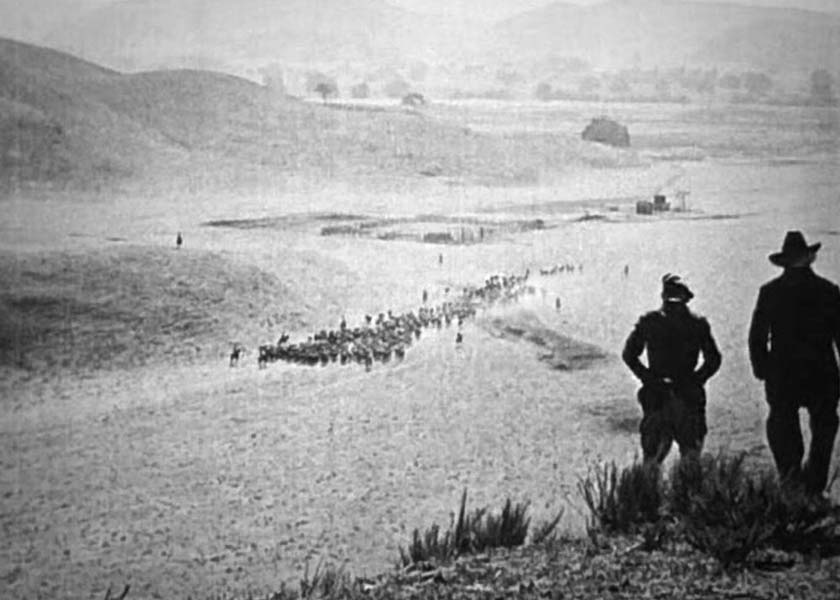Synopsis
Cheyenne Harry (Carey), the foreman of a large western ranch, loves Helen Clayton (Malone), the daughter of his boss, Ben Clayton (Wells). Harry courts Helen, and they plan their marriage. He gives her a love token, a small heart he has carved. Eugene Thornton (Pegg), an attractive Easterner visiting the ranch, courts Helen secretly. On the eve of her marriage to Harry, Helen elopes with Thornton. Harry, broken hearted, accepts his loss and attempts to carry on.
Alone in New York with Thornton, Helen discovers that he and his friends are dissipated and immoral. She breaks the carved heart and sends half of it to Harry as a sign he should come to her aid. Harry goes to New York and finds a reluctant Helen at her wedding party in the company of Thornton and his disreputable companions. Harry needs help getting Helen away from them, and he sends for his cowboy friends who are appearing with the rodeo at Madison Square Garden. Harry's friends saddle their horses and gallop recklessly down Broadway. The fight between Harry and the cowboys against Thornton and his companions fills the garden and restaurant area of the hotel where the bridal party was held. Finally, the cowboys overcome all resistance; Harry knocks out Thornton and embraces Helen who greets him by kissing the carved heart.
Discussion
Bucking Broadway is the fourth in a series of Westerns directed by John Ford and starring Harry Carey that were produced from 1916 to 1922, in which Carey usually playing a westerner named Cheyenne Harry. Despite the constancy of his name, Cheyenne Harry's character, occupation, and interests varied from film to film. Plots were uncomplicated, the stories often centering on Carey subduing the villain and winning the heroine.
Released December, 1917, the film may have been intended as a rousing offering for the Christmas season. The introductory scenes occur in the open spaces of the west where Cheyenne Harry and other cowboys ride the range. The easterner takes the heroine into the confined spaces of New York City. To rescue her, the cowboys ride wildly down Broadway (actually a main thoroughfare of Los Angeles standing in for the famous New York street) and plunge into an all-out fight in a posh hotel. Contrasting west and east, the plot finds Carey and his plain friends more upright than the decadant city people with their fine clothes and surroundings.
Harry Carey was a capable actor, mature and unremarkable looking but a substantial presence nonetheless, easygoing and good-natured, but dynamic and forceful when in action. He employed a few distinctive gestures when thoughtful or disturbed: rubbing his thumb down his chin, pushing back his hat, folding his arms and holding his elbows, or pulling his horse's tail. Carey started in films with the Biograph Company and appeared in dozens of D.W. Griffith shorts from 1909-13, including The Musketeers of Pig Alley. In 1915, Carey went to Universal Film Manufacturing Company and quickly become a Western star. Carey originated Cheyenne Harry in A Knight of the Range (1916) and had played the character in several films directed by Fred Kelsey before making The Soul Herder (1917), his first film with director John Ford.
Straight Shooting was the sixth film directed by John Ford, and his first feature. He continued making Westerns with Harry Carey until 1922, when they had a falling out. They did not work together again until 1936.
Molly Malone and Vester Pegg were cast in several of the Ford-Carey films of 1917-18. Malone had entered films in 1917 at age 29. In 1920-21, she was a leading actress with the Goldwyn Company but soon declined into supporting roles with a variety of small companies. She made her final film in 1929. Vester Pegg started in film in 1912 and made many short films through 1919 for companies such as Nestor, Majestic, and Reliance. Pegg was a supporting actor in Westerns through the 1920s and continued as an uncredited extra until 1941. He appeared in several John Ford films in the 1930s, most notably as one of the villanous Plummer brothers in Stagecoach (1939).
Further Reading

